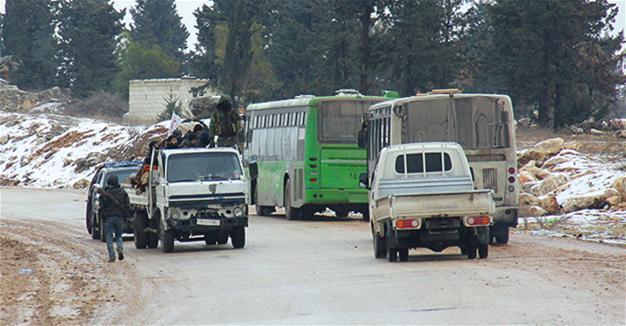Around 40,000 evacuated from Aleppo
ANKARA

AFP photo
Over 40,000 people have been evacuated from besieged parts of eastern Aleppo since efforts to allow people to leave began last week, Turkish Prime Minister Binali Yıldırım said Dec. 22, noting that the last batch of civilians was expected to be transported out of the city by the end of the day.
“Up until today, around 40,000 civilians have been pulled from the fire and transferred to safe places,” Yıldırım said in Ankara.
“This has not been easy. Elements who did not want the war to end in the region and who turned this job [war] into a [business] sector have put in every effort to fire a bullet at peace,” he said.
Convoys carried opposition fighters out of the last rebel pocket of Aleppo on Dec. 22 in the final phase of an evacuation clearing the way for Syria’s army to retake the city.
The evacuation effort has been hampered in recent days by heavy snowfall and freezing temperatures – leaving evacuees waiting in unheated buses for hours – but aid workers said it appeared to be reaching its end.
“We expect today to be the last convoys; the operation will continue all day long and during the night,” said Ingy Sedky, the spokeswoman in Syria for the International Committee of the Red Cross.
About 34,000 people have left the one-time opposition stronghold of east Aleppo since Dec. 15, including all of the wounded and sick in critical condition, according to the ICRC, which is assisting in the evacuation.
Rebel forces, who seized control of east Aleppo in 2012, agreed to withdraw from the bastion after a month-long army offensive that drove them from more than 90 percent of their former territory.
The agreement was brokered by Russia, a key ally of President Bashar al-Assad which launched air strikes in support of the Syrian government last year, and Turkey, which supports the opposition.
More than 4,000 fighters have left rebel-held areas of Aleppo, the ICRC said.
United Nations Special Envoy Staffan de Mistura said on Dec. 22 that a cessation of hostilities across Syria was vital to avoid another deadly battle like the one in Aleppo.
“Many of them have gone to Idlib, which could be the next Aleppo,” de Mistura warned.
Ahmad al-Dbis, who heads a team of doctors and volunteers coordinating evacuations, said around 400 vehicles had arrived overnight on Dec. 22 in Khan al-Assal, the staging ground where evacuees from Aleppo arrive.
It was unclear how many people – either fighters or civilians – remained in Aleppo.
“It is hard to say when the operation will be finished because the roads are snowed under,” said Ahmad Qarra Ali of the powerful Ahrar al-Sham jihadist group.
As part of the evacuation from Aleppo, 182 severely injured civilians were brought to the southern province of Hatay, Turkish authorities said.
Meanwhile, the U.N. General Assembly voted Dec. 21 to establish an investigative body that would assist in documenting and prosecuting the most serious violations of international law in Syria, including possible war crimes and crimes against humanity.
The 193-member world body adopted a resolution by a vote of 105 to 15 with 52 abstentions over strenuous objections from Syria and close ally Russia which accused the assembly of interfering in the work of the Security Council, which is responsible for issues of international peace and security.
Liechtenstein’s U.N. ambassador, Christian Wenaweser, who sponsored the resolution, said vetoes in the Security Council, by Russia, “have led to inaction at the expense of the people of Syria.”
“Our inaction tends to signal that war crimes and crimes against humanity are condoned and have no consequences,” he said.
UN inquiry unable to ID perpetrators of Syria aid convoy bombing
On Dec. 21, a U.N. aid convoy that was bombed while en route to the besieged city of Aleppo in September came under an air attack, a U.N. inquiry concluded, but it was unable to identify the perpetrators, though it stated it was “highly likely” to have been carried out by Syrian government forces.
The board of inquiry found that “while the incident was caused by an air attack, it was not possible to identify the perpetrator or perpetrators,” said a summary of the findings released on Dec. 21.
The convoy was “subject to an attack from the air, using multiple types of munitions deployed from more than one aircraft and aircraft type,” the inquiry found.
The munitions used during the 30-minute asault may have included missiles, rockets and small bombs, it added.
At least 10 people were killed and 22 injured in the Sept. 19 attack at Urem al-Kubra, near the northern city of Aleppo, as a fragile cease-fire agreed to by the United States and Russia collapsed.
The board rejected allegations that the attack could have been carried out by direct fire or a ground assault in the rebel-held area.
It noted that Syria and Russia as well as the U.S.-led coalition “all had the capabilities needed to carry out an attack of the kind” that took place that day.
But it concluded the involvement of coalition aircraft was “highly unlikely.”
The board said it had received reports that three Syria helicopters and three aircraft were “highly likely” to have perpetrated the attack and that a Russian plane was also suspected of being involved.
“However, the board did not have access to raw data to support these assertions and, in their absence, it was unable to draw a definitive conclusion,” it said.
Russia and Syria have denied involvement in the bombing.
